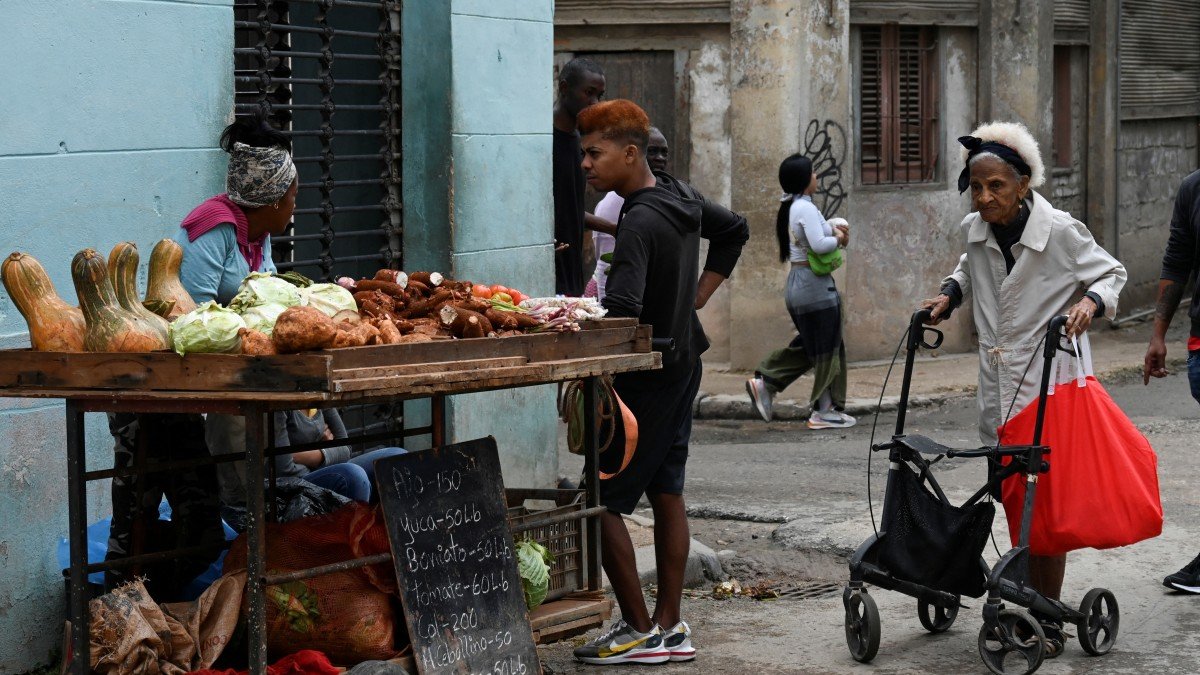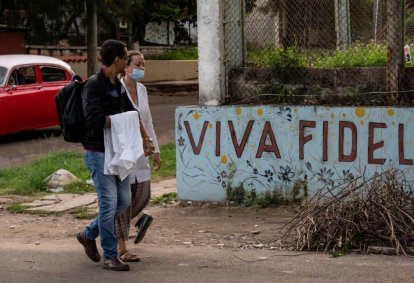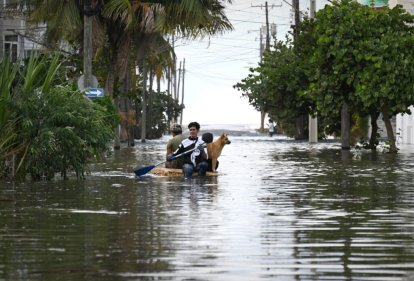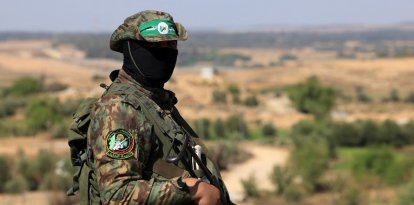Hunger, terror and despair: Cuba faces its worst humanitarian crisis in decades
The situation in Cuba has caused an exodus the likes of which have not been seen since the beginning of Fidel Castro's Revolution.

People buy food on a street in Havana. (Photo by YAMIL LAGE / AFP)
Cuba is going through one of its worst economic crises, reminiscent of what it suffered in the 1990s, during the so-called Special Period, after the collapse of the Soviet Union. Once again, hunger, scarcity, the increase in the cost of living and cruel repression dictate life for residents on the island.
"The regime has plunged the Cuban people into a deep humanitarian crisis, marked by hunger, systemic failures in health and transportation services, the absolute ineptitude and negligence of the State, political repression and violence," the renowned Cuban activist Rosa María Payá told Voz Media.
This week, for the first time in its history, the Cuban regime officially requested help from the United Nations Food Program due to a shortage of subsidized milk for children under seven years old.
The plea for help is unprecedented and far from a subtle recognition of Cuba's structural problems. It's not that the island was enjoying prosperity before the request was made. The small amount of milk available was subsidized through a ration card because the liquid or powdered milk sold by merchants has prices that "are inaccessible to the vast majority of the population," says the BBC.
Since the Cuban Revolution took power in the 1960s, and after completely suppressing private initiative and nationalizing the economy, a model of assistance and control has been in force in Cuba, which rules over the impoverished people.
According to the Cuban Observatory of Human Rights, based in Madrid, in this decade, 92% of Cubans live in poverty while 62% "survive with the minimum."
The situation, then, was already serious, but it has worsened significantly in recent months.

Impoverished
"There are reports of shortages. For the first time in history, the regime asked the UN for help; why? Cuba is undoubtedly going through a severe economic crisis characterized by the shortage of numerous basic products, including food, fuel and medicine. Something that Cubans have suffered recurrently for almost seven decades," activist Frank Zimmerman, director of the think tank Liberty Plus, told Voz Media.
In parallel with the request for help from the United Nations, the Miguel Díaz-Canel regime applied a massive increase in fuel prices as of this Friday.
This is a massive increase of more than 400%. In addition to this measure, which is part of an adjustment plan, another significant increase in electricity and water rates is proposed.
According to the dictatorship's Minister of Energy and Mines, Vicente de la O Levy, the purpose of the measures is "to achieve fuel replenishment and cause savings in those who consume more."
However, just before applying the measure, the regime dismissed its Minister of Economy, Alejandro Gil, for publicly recognizing that his government could not continue subsidizing fuel and services due to the precarious economic situation.
Manuel Ángel Rodríguez, who lives in Havana, told Voz Media that since the measure was announced, there has been fear and panic among the population.
"With the subsidized gasoline, there were long lines, but when they said they were going to increase... My friend that tripled... Yesterday, Thursday, you had to see it: hours and hours to fill the tank," Rodríguez said.
Rodríguez told Voz Media that the gas stations did not wake up this Friday with so many vehicles parked waiting to fill the tanks. "As you can see, there are already new prices. It is already a reality. Let's see what happens," he said.
The Cuban regime, which used careful rhetoric to skirt around the issues in order to avoid suggesting that things are going in the wrong direction, now says that it is "aware that the measures have an inflationary impact" but that they will adopt "a group of decisions to mitigate the impact."
However, the regime had already said that the package would only be applied when the conditions were appropriate and would not affect "the most vulnerable groups."
Almost a year ago, in April 2023, foreseeing the worsening of the crisis, the dictator Miguel Díaz-Canel said that the fuel shortage was due - and was going to be due, warning - to the "non-compliance of the countries that supply crude oil to the island due to its own complex energy situation."
Díaz-Canel was referring to the dictatorship of Nicolás Maduro in Venezuela, which has been the island's primary economic support for years. By providing oil to Cuba, primarily gifted or in exchange for strategic assistance, Venezuela allowed the Cuban regime to maintain some stability and control of the economy.
But Venezuela's oil industry is finished. Venezuela went from producing almost 3 million barrels of oil daily in 1998 to just over 300,000 in 2020. This decrease, in addition to the corruption scandals, which account for unprecedented embezzlement in the hemisphere, has complicated the issue. In 2019, the United States Government also imposed sanctions on the Venezuelan state oil company PDVSA.
All of this, of course, undermined Venezuela's assistance to Cuba.

Run away like you haven't run away in decades
"The crisis of Castroism is a systemic crisis, which I would describe as a crisis upon crisis. The country has no infrastructure, there are no industries and the uncontrollable stampede of Cubans increases the disaster," Antonio Rodiles, renowned Cuban human rights activist and dissident, told Voz Media.
"Despite receiving oil from its partners, such as Venezuela, Mexico and Russia, the regime is unable to supply the internal market. Growing inflation forces them to raise fuel prices," he said.
For Rodiles, the current crisis is a consequence of decades of accumulation of "inoperative" management. What Cuba is going through today can only be compared to what it suffered more than 30 years ago. And, since then, "subsequent crises have accumulated."
"The unprecedented lies in the accumulation."
The moment is desperate. The majority of Cubans live in absolute uncertainty. Mothers cannot find food for their children, and many continue to choose to leave the country.
"The desperation is so great, that people continue to jump into the sea, to see if the sharks eat them, to try to reach Miami. That has not stopped. It has not stopped in 60 years and it is not going to stop," Manuel Ángel Rodríguez commented.
"I have a large part of my family in Miami. They all went by sea. And it is not an easy path. You don't know the number of people who have died trying," Rodríguez added.
They are the balseros [Spanish for rafters]. Those who risk their lives adrift at sea, praying to avoid shipwreck. Those who face the fury of the Caribbean to escape from an island they consider a prison.
According to the United States Department of Homeland Security, in 2023, more than 6,200 Cubans arrived by sea in Miami. This was an increase compared to the previous year when 6,182 traveled by sea. Likewise, between 2022 and 2023, more than 530 thousand Cubans arrived in different ways, such as the southern border or via humanitarian trips, to the United States, a number that represents 4.8% of the island's population, which is 11 million.
"This is equivalent to emptying entire provinces of the island in just two years. These staggering figures do not take into account the thousands more who have headed to Brazil, Russia, Uruguay and other countries during the same time," reads a report from the Washington Office on Latin American(WOLA, for its acronym in English).
This is the most significant migratory exodus of Cubans in decades. "This is the largest number ever recorded in two consecutive years since migration began after the revolution in 1959," Jorge Duany, the director of the Cuban Research Institute at Florida International University, told AFP.
"There is hunger here. I'm telling you, this situation is unbearable," Manuel Ángel Rodríguez insisted to Voz Media.
Time to keep fighting
For Frank Zimmerman, the current crisis is "one more in the long list of economic crises that the country has suffered."
People are getting fed up. Zimmerman says a similar spirit of disobedience has not been felt since July 2021, when thousands of Cubans took to the streets to protest in one of the most important expressions of dissent in recent years. The regime answered the protests with furious repression.
"There is fatigue and frustration. Discontent is being generated in the population, which has not been seen in years," he said.
For Rodiles, the situation, however critical, presents an opportunity. "It constitutes a shock. It is a clear example that neo-Castroism cannot take hold," he says. However, he assures that "unfortunately, the opposition is at its weakest point in decades."
"The lack of political support and resources, the miserable situation that hits everyone and especially activists, leaves the regime with hardly any counterforce," he said.
In the end, the memory of the dark days that followed the protests of July 11, 2021, still haunts Cubans. The demonstrations, which were encouraged by millions around the world, crashed against the brutality of the State.
The result of the protests, which lasted about six days, were five people murdered by the regime, more than 500 detained, and excessive sentences to punish the protesters for life.
The organization Prisoners Defenders reported on July 14 that the regime had forcibly disappeared at least 187 people.
After more than 60 years of an unrelentingly firm dictatorship, it seems that freedom is unattainable. It appears as if there is nothing to do and no way to go about it. It seems that the Castro dynasty, which started with Fidel, continued with Raúl and Díaz-Canel protects today, will remain unbeatable.
But not everyone has lost hope. For activist Rosa María Payá, daughter of Oswaldo Payá, one of Cuba's most prominent opposition leaders who was assassinated in 2012, Cubans are ready to recover what belongs to them.
"One thing is clear: The only way out of the crisis is the way out of the dictatorship. We Cubans know this, which is why protests in the streets continue to increase despite the brutal repression, hunger and exodus. We Cubans are ready for change," Payá said.
For Payá, who is also the founder of the organization Cuba Decide, there is coordination to seek a transition on the island. She also denounces that international complicity has been one of the fundamental supports of the dictatorship.
"All the money given to dictators will go to the repressive apparatus and the corruption machinery. We know from our own experience that even donations are confiscated by the authorities," she informed, regarding the request to the United Nations.
Rosa María Payá concluded by telling Voz Media: "We want to inform people that if they want to help stop the humanitarian crisis in my country and stabilize the region, they must put pressure on the Cuban regime with all their means to submit to the sovereign will of the citizens."

























